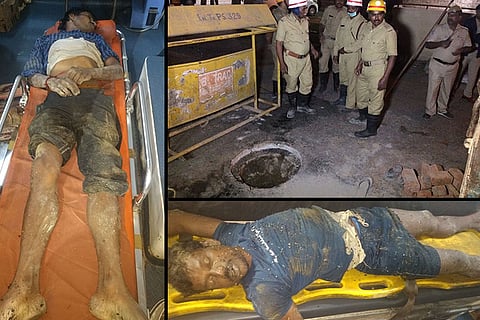

Apathy, exploitation and disregard for both law and life killed three manual scavengers in Bengaluru on Tuesday. But two days later, the police have not made any arrests in the case. No BWSSB engineer or contractor of the firm has been named in the FIR.
While the state officials have conveniently washed their hands off the incident, the contractor who employed Yerraiah, Anjaneya Reddy and Dhavathi Naidu is still absconding.
On Tuesday, the three men were sent to clear a clog in a manhole in Bengaluru’s CV Raman Nagar. They died of asphyxiation from the toxic fumes in the manhole, and the man who sent them to their deaths - Anjeneyulu, the managing director of Anantharaja Constructions - went on the run.
Friends and colleagues of the three dead men allege that the owner did not even show up to see the bodies, and sent his middlemen to negotiate a settlement with the victims’ families instead.
“He did not even have the decency to come and see the bodies or console the families. He’s run away like a coward. Where is he?” asks an angry Narsaiah*, who also works as a cleaner for Anjeneyulu’s company.
The criminal contractor
Anantharaja Constructions is the company which was subcontracted by Ramky Enterprises to clean the manholes in Bengaluru. The News Minute spoke to the men employed by the company - colleagues of Yerraiah, Anjaneya Reddy and Dhavathi Naidu - and the story that they told us is beyond shocking.
While manual scavenging is illegal in India, Anjeneyulu employed several people to clean drains in the city. He sent the men out to work in the wee hours of the day, as there is less traffic during these times. “Otherwise we might get run over by vehicles,” says Santosh* one of Yerraiah’s colleagues.
Santosh came to Bengaluru six years ago, and took to cleaning dishes for a man who owned a chaat stall in Seetharampalya. He was given Rs 20 per day, and two years later, he realised he needed more money for his daughter’s education.
“One man called Babu used to come by the slum where I lived and he offered me Rs 500 for cleaning one manhole. It was better that Rs 20 per day, so I took it,” says Santosh.
The workers have always dealt with a middleman - a mestri - whose name they do not know. He comes by their homes when he needed work done, and has not even shared his phone number with the workers.
And the mestri - and in turn the employer Anjeneyulu - deliberately denied any safety equipment to them, the workers allege.
“No matter how many times we asked for masks and at least gloves, the contractor did not give it to us. Our mestri once said, okay, I will give the mask, but you pay for it,” says Santosh.
“Sometimes, the mestri does not even provide us with a torch when we go inside,” alleges Narsaiah*, another worker. Without lights, without any way of communicating with the outside world, the workers are exploited every time for a pittance.
Narsaiah says that while some workers have a cellphone, and use it for light, others find it extremely difficult to work inside the manhole.
“When we told him that we would file a complaint, he threatened to fire us. We don’t even know his name or phone number. He would just come by whenever there was a job,” Santhosh says.
Systemic exploitation and apathy
The story of their exploitation is systemic. According to Narayana, member of the Commission for Safai Karamchari, 90% of those employed as manual scavengers are Dalits.
“There are over 15,000 manual scavengers in Karnataka and around 600 of them have been identified by the state government. The Siddaramaiah government had promised to put an end to this, but nothing has happened,” Narayana says.
For the workers, the fact that manual scavenging is illegal does is neither here nor there. “I did not know anything about the law when I took up the job,” says Santosh. “And even if it is illegal, should we sit and watch while our wives and children starve?” he asks.
Officials wash hands off
The Bengaluru Water Supply and Sewerage Board (BWSSB), meanwhile, has put the blame completely on the private contractor.
A senior BWSSB official said that the firm, Anantharaja Constructions had submitted a request for payment for a pending bill before the incident. “We had told them that officers would inspect the spots before payment. The three men were deployed in the wee hours to de congest the drain as it was listed as one of the items on the bill,” he says.
“If they had come to us for a jetting machine, we would have known that they had sent us a bill for work that was not yet done. That’s why they did it in such a hurry,” the official claimed.
According to BWSSB Chief Engineer Manjunath, the BWSSB has one jetting machine for three wards and the contractors do not have to pay any money to avail the facilities of the jetting machines.
“They can come and pick up the machines whenever there is a need for it. We are planning to bring in more jetting machines, maybe one for every ward,” Manjunath said.
But for the friends of Yerraiah, Anjaneya Reddy and Dhavathi Naidu - and countless other manual scavengers who have died in India due to official apathy - these are just empty words.
“Just because we are Dalits and clean up the dirt produced by the rich people, we become untouchables,” says Santosh. “Should my child face this kind of treatment? Do our children not deserve better lives?” he asks.
As Narsaiah says, “They think of us only when a dirty hole has to be cleaned up.”
*Names changed under request.